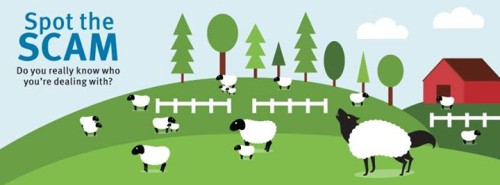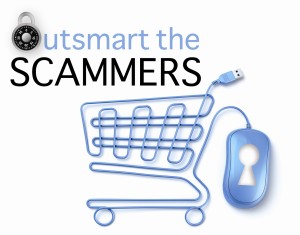National Consumer Fraud Week 16 – 22 June 2014
AUSTRALASIAN CONSUMER FRAUD TASKFORCE
THINK TWICE BEFORE TRANSFERRING MONEY TO SOMEONE YOU ME T ONLINE
T ONLINE
‘KNOW WHO YOU’RE DEALING WITH' 2014 FRAUD WEEK CAMPAIGN 16 – 22 JUNE
The Australasian Consumer Fraud Taskforce is calling upon Australians to take a step back and think about whether someone they met online is the real deal, particularly if they ask for money.
The Taskforce's National Consumer Fraud Week campaign, ‘Know who you’re dealing with’, focuses on relationship scams and helping Australians learn how to identify, avoid and disengage from scammers.
To coincide with the campaign, the ACCC launched its fifth Targeting Scams annual report, which reveals that dating and romance scams moved to number one position in terms of financial losses, with over $25 million reported lost to a scam admirer.
As part of Fraud Week 2014, the Taskforce has released a ‘Top 5 Scam Identifier’ list to help Australians identify and disengage from scammers online:
-
You’ve never met or seen them: scammers will say anything to avoid a ‘face-to-face’ meeting, whether it be in person or over the internet via a video chat – don’t excuse it away.
-
They’re not who they appear to be: scammers steal photos and profiles from real people to create an appealing facade. Run a Google Image search on photos and search words in their description to check if they’re the real deal.
-
They ask to chat with you privately: scammers will try and move the conversation away from the scrutiny of community platforms to a one-on-one interaction such as email or phone – ‘walk’ away if this happens to you.
-
You don’t know a lot about them: scammers are keen to get to know you as much as possible, but are less forthcoming about themselves. Ask yourself, ‘how well do I really know this person?’
-
They ask you for money: once the connection’s been made – be it as a friend, admirer, or business partner – scammers will ask you to transfer money. Don’t fall for a tall tale, not matter how plausible it sounds.
The Taskforce comprises 23 government agencies across Australia and New Zealand with responsibility for consumer protection regarding frauds and scams.
For more information on the Taskforce and National Consumer Fraud Week visit www.scamwatch.gov.au/fraudweek2014.
Previous National Consumer Fraud Week campaigns
National Consumer Fraud Week 17 – 23 June 2013
An Australasian Consumer Fraud Taskforce initiative
Have you ever bought or sold something online, only to find that the person at the other end isn’t the real deal?
National Consumer Fraud Week 2013 was all about outsmarting scammers online by learning how to buy and sell safely online without being duped.
Australians are increasingly going online to buy goods and services, taking advantage of the speed, convenience and greater choice that the internet can offer. Unfortunately scammers like shopping online for their victims too.
ACCC have teamed up with The Checkout to provide tips on online shopping to help outsmart the scammers.
Stay one click ahead – follow the Top 5 tips to outsmart the scammers:
-
Think twice – if a deal looks too good to be true, it probably is.
-
Find out what other shoppers say – make sure the person that you are dealing with, and their offer, is the real deal.
-
Protect your identity – your personal details are private and invaluable; keep them that way and away from scammers.
-
Keep your computer secure – Install software that protects your computer from viruses and unwanted programs and make sure it is kept up-to-date.
-
Only pay via secure payment methods – look for a web address starting with ‘https’ and a closed padlock symbol. Never use a wire transfer service to send money to anyone you do not know and trust, and do not share your financial details with anyone.
Visit SCAMwatch to find out how scams work, how to protect yourself and what to do if you’ve been scammed:




